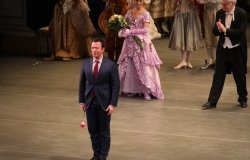Budget Priorities in Conflict
Overview
Even in these days of projected budget surpluses, the same clashes are occurring between the president and Congress as in the days of deficit spending, said budget veteran Leon Panetta at a February 11 Woodrow Wilson Center seminar. The only effective budgets, he argued, are realistic budgets that can be achieved and enforced -- in other words, that stress two or three important priorities instead of hundreds of new programs and projects. But, Panetta said, such realistic budgets involve taking political risks and exercising leadership, and few are willing to take such risks after seeing what happened to President Bush in 1992 and the Democratic Congress in 1994.
The budget process is eight months of posturing followed by one month of hard dealing, Panetta explained. He likened the process to the scene in the movie Braveheart when the warriors pound their spears on the ground and taunt each other while the nobles back in the castle make the real deal on how to allocate the land.
Panetta, who served as House Budget Committee chairman for four years before taking the job as Clinton's budget director in 1993, said that Congress had passed the1974 Budget Act primarily to stop President Nixon from impounding funds appropriated for public works projects. At the time, few realized that the new budget process would transform business as usual in Congress. Members still expected to drink at the appropriations bar -- except that they would have a bartender to count the bottles, Panetta said.
All of the seminar participants agreed that neither the president nor Congress has dominance over the other when it comes to controlling the purse strings, especially under divided party government in which negotiated compromises between the branches are the only way to get anything done.
But in Panetta's view, the president is still primarily responsible for setting national budget priorities because the Executive Branch is not a democracy. Congress, on the other hand, consists of 535 separate fiefdoms in which each member has one vote and therefore expects to have some leverage in the process. The Budget Committee can pretend to set priorities, but the real power lies with the thirteen appropriations subcommittees that end up negotiating the final deals with the President. In Congress, priorities are set more by coalition-building than by party principles. Putting together a majority vote depends more on the needs of members than on the needs of the nation, Panetta concluded.
Another former player in the federal budget process Bill Frenzel lamented that there is little trust or credibility left between the parties in Congress, making the budget process all the more difficult to implement. He observed that the days are over when Congress could achieve a bipartisan compromise on the budget. Today's budgets are partisan documents that draw the lines between the parties and their differing priorities. Ideally, more discipline should be incorporated into the budget process to curb Congress's propensity to spend; but that's not going to happen, Frenzel said. He recommended that the budget resolution be subject to the President's signature. This would involve the Executive Branch in the process much earlier and hopefully iron out the problems before it is time to make decisions.
Political scientist Barbara Sinclair said that Congress no longer operates according to the textbook diagrams of lawmaking. Instead, it has been forced to resort to extraordinary procedural devices to pass major -- especially budgetary -- bills. These include more leadership involvement at all stages of a bill's progress, the use of omnibus bills that enact dozens of policies with one vote, post-committee adjustments and restrictive floor amendments procedures, and budget summits between the White House and Congress. It's not a pretty process and deliberation suffers, commented Sinclair; but it is essential to avoid gridlock. (The findings of her studies on Congress are summarized in her seminar paper and can also be found in her recent book, Unorthodox Lawmaking: New Legislative Processes in the U.S. Congress.)
George Hager, a prize-winning former budget reporter for Congressional Quarterly and the Washington Post, said he had enjoyed the budget beat because of the personalities involved but had found it challenging to make the process understandable to the reading public. Hager, now an economics reporter for USA Today, said his most frustrating times had been when covering high-level budget summits. The sessions are closed, and reporters get very little news. Virtually nothing is achieved for weeks -- until the number of negotiators is finally whittled down from twenty or more to around eight top leaders from the White House and Congress.
Hager noted the supreme irony when in 1995 Newt Gingrich, who had led Republicans in their takeover of the House, halted the "revolution" because he felt he had not been treated well by the President aboard Air Force One on a trip to Israel. The subsequent "Cry Baby" headline and cartoon on the front of a New York tabloid was the ultimate humiliation and symbol of Gingrich's failed budget strategy, Hager said.
Documents & Downloads
Thank you for your interest in this event. Please send any feedback or questions to our Events staff.









